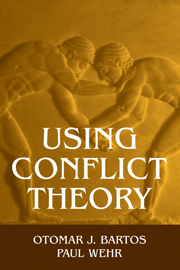Book contents
- Frontmatter
- Contents
- List of Figures and Tables
- Acknowledgments
- 1 Introduction
- 2 Understanding Conflict
- 3 Development of Incompatible Goals
- 4 Application to the Civil Rights Struggle
- 5 Emergence of Overt Conflicts
- 6 Application to a University Conflict
- 7 Escalation and Deescalation
- 8 Application to Conflict in Bosnia
- 9 Making Conflict Work Economically
- 10 Understanding and Managing Conflicts
- Appendix: Prelude to the Dissolution of Yugoslavia
- Notes
- References
- Index
2 - Understanding Conflict
Published online by Cambridge University Press: 05 June 2012
- Frontmatter
- Contents
- List of Figures and Tables
- Acknowledgments
- 1 Introduction
- 2 Understanding Conflict
- 3 Development of Incompatible Goals
- 4 Application to the Civil Rights Struggle
- 5 Emergence of Overt Conflicts
- 6 Application to a University Conflict
- 7 Escalation and Deescalation
- 8 Application to Conflict in Bosnia
- 9 Making Conflict Work Economically
- 10 Understanding and Managing Conflicts
- Appendix: Prelude to the Dissolution of Yugoslavia
- Notes
- References
- Index
Summary
in the 1880s ranchers in the western United States fought over water rights; in 1939 Germany attacked Poland; last week a husband and wife argued bitterly over their finances. That all were engaged in a conflict is obvious. In fact, it may seem that nothing is simpler than recognizing a conflict – after all, it involves fighting, does it not? Actually, no, not always. Some conflicts are “latent” and do not involve overt fighting; and some overt fights, such as wrestling matches, are not due to a conflict. Thus it is important to agree on what is and what is not a conflict.
What Is a Conflict?
It might not surprise you to hear that even theoreticians differ in how they view conflict. For many practical purposes, they may understand it as a special set of interrelated elements: parties, issues, dynamics, and contexts. To gain a deeper understanding, however, they may use certain abstract concepts such as cause and effect; direct, indirect, and intervening causes; and payoff matrices. The discussion in this chapter deals with these concepts.
Students of social conflict have offered many different definitions of conflict. Early on, Park and Burgess defined it simply as struggle for status. Somewhat later, Mack and Snyder defined it as struggle not only for status but also for scarce resources and significant social change (Himes 1980, 12). Other writers have offered additional definitions. How then should we conceive of conflict?
- Type
- Chapter
- Information
- Using Conflict Theory , pp. 12 - 28Publisher: Cambridge University PressPrint publication year: 2002
- 1
- Cited by



